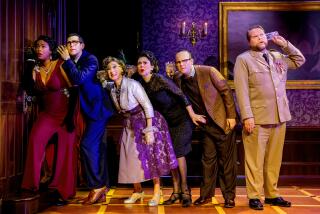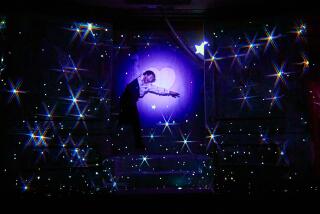An oddly satisfying âLobsterâ
Only history could be so surreal: In 1946, Salvador Dali spent six weeks at Walt Disney Studios hanging out with a young animator working on âAlice in Wonderland.â Enticed by this tantalizing footnote in the artistâs biography, playwright Kira Obolensky invents a theatrical dream world in which the man who famously envisioned melting clocks helps (in his signature boundary-blurring way) a reluctant couple melt into each other.
Not surprisingly, âLobster Alice,â which opened Saturday at the Blank Theatre Companyâs 2nd Stage Theatre with actor Noah Wyle transforming himself into the flamboyantly self-dramatizing painter, is an invitation for the most delightful visual whimsy. Treated as a hallucinatory screwball comedy by Blank artistic director Daniel Henning, the production opens a portal to a wonderland that, like a Dali canvas, grows more troubling as its deranged details come into view.
For the record:
12:00 a.m. Aug. 5, 2006 For The Record
Los Angeles Times Saturday August 05, 2006 Home Edition Main News Part A Page 2 National Desk 0 inches; 26 words Type of Material: Correction
âLobster Aliceâ: A review of the play âLobster Aliceâ in Mondayâs Calendar section misspelled the first name of the late film star Carole Lombard as Carol.
Admittedly, the thimbleful of story doesnât stretch very far. And the moral (yes, thereâs one of those) seems quaint to the point of trifling. Yet style-wise the piece is inspired.
The three leads turn in nearly pitch-perfect performances that conjure a particular 1940s Hollywood universe. Finch (Nicholas Brendon) is prepared to sacrifice everything to the corporate boss, including a personal life. He wants to make genial movies American families can brainlessly adore, even when heâs working on something as reality-skewing as Lewis Carrollâs classic.
Alice (Dorie Barton, in snazzy period outfits that would have made Carol Lombard jealous) is his office assistant. Sheâs too smart for the job but sticks around out of a slow-budding affection she hopes will eventually blossom into something more meaningful.
Enter the mustachioed great man, an artiste not above commercial dabbling as long as he doesnât have to satisfy anything but his own whims. Opposed to blockage of any kind (creative, erotic or plain old intestinal), he works to liberate the office energy, loosening Finchâs grip on conventionality, releasing the animal inside of Alice and routinely checking in on everyoneâs personal (and I mean personal!) business.
Itâs not long before Finch, doodling day and night at his desk, breaks out in a cold sweat as the characters from âAlice in Wonderlandâ take on qualities of Daliâs sinister influence. (Brendonâs portrayal brings to mind Matthew Broderick quaking on amphetamines.) And while Aliceâs introduction to the limitless carnal possibilities of the bohemian world springs her long hair from its stylish snood, itâs evident from the slightly zonked look in Bartonâs eyes that the adventures are taking a toll.
Wyle, acting in a madcap reverie that his old character on âERâ would have found grounds for the psych ward, memorably illustrates a personality more topsy-turvy than any Disney could imagine. Not only is the low register of his European playboy accent perfect, but his uninhibited eccentricity is tactfully calibrated to never upstage whatâs really at stake: the would-be loversâ return to a romantically heightened normality.
Kudos to Henningâs design team for creating such a fluid realm of theatrical fantasy. Thereâs so much to praise in Robert Priorâs magical sets and costumes, but the white couch that allows entry to another dimension of anthropomorphic existence is a stroke of silly genius.
When Thorton (Michael Grant Terry), Aliceâs former beau who was killed in the war, arrives from some hidden hole in the sofa to shed light on her back story, who would ever expect heâd be followed by an array of creatures, crustacean and otherwise, whose cuteness only intensifies their borderline psychotic menace.
If only the playâs dramatic vision were as integrated as its pictorial possibilities.
But Henningâs fluid production vividly makes Obolenskyâs point that as nice a place as the subconscious is to visit, you wouldnât necessarily want to live there.
*
âLobster Aliceâ
Where: 2nd Stage Theatre, 6500 Santa Monica Blvd., Hollywood
When: 8 p.m. Thursdays through Saturdays, 3 and 7 p.m. Sundays
Ends: Sept. 3
Price: $22 to $28
Contact: (323) 661-9827
Running time: 1 hour, 30 minutes
More to Read
The biggest entertainment stories
Get our big stories about Hollywood, film, television, music, arts, culture and more right in your inbox as soon as they publish.
You may occasionally receive promotional content from the Los Angeles Times.











